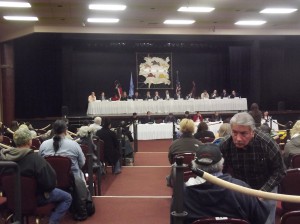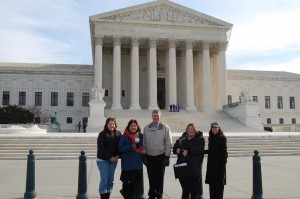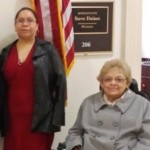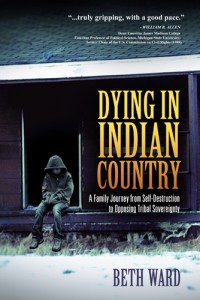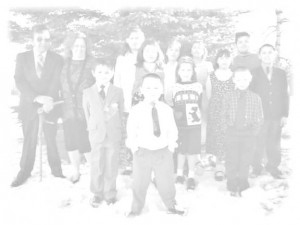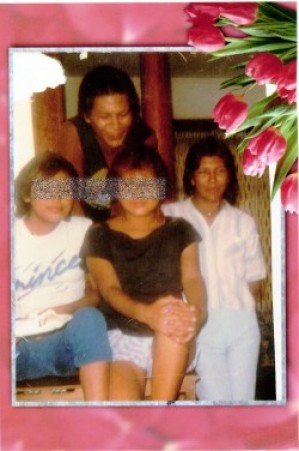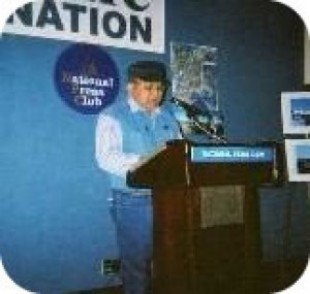Senator Hoeven,
Thank you again for your concern for the vulnerable in our state. I have received a copy of the 13th mandated report from Mr. Thomas Sullivan of the Denver office of Administration for Children and Families. I have attached a copy.
According to Mr. Sullivan, the situation remains the same on the Spirit Lake Reservation and children continue to be abused while perpetrators go free. Further, he reports that we were lied to by the U.S. attorney on February 27 when those gathered at the Spirit Lake town hall meeting were assured that he was going to speak to the elderly woman who stood up last to tell her story. Mr. Larson will remember her, I am sure. She tried very hard to speak at that meeting but wasn’t allowed to. Tragically, because of the neglect of her story, the two children she tried to talk about – who obviously, desperately, need to be taken from that home immediately and given intense counseling, have been observed continuing the same behavior and another child was hurt. May God be with us – how is it that we as a state and nation allow this to continue?
It has also been inferred that Mr. Sullivan could lose his job if he continues to stand up for the families and children.
Lastly, this report supports and affirms Representative Cramer’s assertion that justice in the Spirit Lake tribal court is far from assured. I applaud Rep. Cramer for his courage.
Please insist on hearings as to how Spirit Lake is being handled. Please also protect Mr. Sullivan to the extent that you can, and continue to stand up for all of us.
If our opponents believe we will sooner or later get tired and go away, they are wrong. We will not. I have been trying to bring attention to these types of things since 1996 and it has only gotten worse. I am not going away.
Thank you.
Elizabeth Sharon (Lisa) Morris
Chairwoman
Christian Alliance for Indian Child Welfare (CAICW)
https://caicw.org
———————– Page 1———————–
March 29, 2013
This is my Thirteenth Mandated Report concerning Suspected Child Abuse on the Spirit Lake Reservation. It is being filed consistent with the Attorney General’s Revised Guidelines.
The two weeks following the submission of my Twelfth Mandated Report on February 22, 2013 were marked by a remarkably intense Public Relations campaign by both the Department of Justice and the Bureau of Indian Affairs. They sought to convince all that the children of Spirit Lake were safe, that all of the problems at Spirit Lake were well on the way to being fixed, that all allegations had been or were being investigated, witnesses had been interviewed and statements taken. The facts, however, do not support their misleading PR puffery.
Their puffery campaign took several different approaches, all calculated to raise questions about the credibility of my Reports:
1. Public statements were made that many of the allegations contained in my Reports were false. There are two problems with those self-serving statements. Even though innocent citizens of Spirit Lake have been beaten, raped and required hospitalization to recover from their wounds you folks claim there has been no crime because the investigation was done so unprofessionally, there was no investigation or the paperwork has been “lost”. When this occurs once or twice, it is an unfortunate error. When it occurs routinely as it does at Spirit Lake, it is nothing short of a corrupt abuse of power which DOJ and BIA apparently endorse since there appear to be no limits to their praise for Spirit Lake law enforcement..
Second, all of you ignored the statement of Tribal Chair Roger Yankton made on November 5, 2012 in a Tribal General Assembly, “I know of no lies in Sullivan’s Reports.” When Mr. Yankton made that statement I had filed Seven Mandated Reports containing 90 – 95% of the specific, unduplicated allegations I have made. The Tribal Chair was honest. The best that can be said of the DOJ and BIA leadership is that they were self-serving.
2. Another attempt to diminish the credibility of the allegations contained in my Reports was to refer to them as “second or third hand”. While I have not personally witnessed any of the incidents I have been reporting, they ———————– Page 2———————–
have been witnessed by Tribal Elders, a Nun, a former Tribal Judge, foster parents, parents, all enrolled members of the Spirit Lake Nation. None of these people have any reason to lie about what they were reporting on their Reservation. Some allegations come from individuals who are not enrolled members but who are former long term employees of the Tribe who have been reporting Tribal wrongdoing for years to the state, DOJ and BIA .
All of these sources, both enrolled Tribal members and non-enrolled, are furious their allegations have been ignored for years exposing the children of Spirit Lake to continued abuse and neglect. They believe even now they are still being ignored for the benefit of the addict, the predator and the corrupt.
All of my sources have been threatened by the supporters of the Tribal Council with loss of employment, jail, as well as physical harm to themselves or their families. While I have not been directly threatened, I have been told my persistence in this matter places me at the same risk as my sources. I am deeply offended that all of you refuse to defend the innocent of Spirit Lake when my sources and I are placing our physical safety on the line. Your cavalier dismissal of my reports which accurately reflect the stories of my sources is especially troubling.
3. Within this context it is hypocritical for the leaders of DOJ and BIA to now tell tribal members that “the most important thing they can do to protect children is to immediately report any criminal activity to law enforcement.”
The twelve year old who had just turned thirteen and was raped on September 29, 2012 by a 37 year old man reported the rape to police immediately. The name address and a description of the rapist were provided to the responding officers. No rape kit was collected. No charges were filed because the BIA/FBI decided the sex was consensual, in the 37 year old rapist’s words, “She wanted to have sex with me. What was I supposed to do?” How naïve do you think we are that you believe we will swallow such patent nonsense? How does this decision protect children?
The Tribal Elder who observed two little boys engaging in anal sex in her yard did call police immediately. No one in law enforcement took her statement. She tried to tell her story at the February 27, 2013 Hearing but she was shushed by the US Attorney, the BIA leadership and all of those
———————– Page 3———————–
on the platform. The US Attorney did say publicly that he would speak to her privately after the Hearing concluded. He did not. Nor did anyone from his office take her statement. How did these actions protect children?
One day later, on February 28, 2013, these same two boys were observed by two little girls engaging in oral sex on a Spirit Lake school bus. The little girls reported this to the bus driver, their teachers and the school principal.
All of these responsible people kept quiet about this incident. None filed a Form 960 as required. How do these actions protect children?
On March 14, 2013 law enforcement went to the home of these two boys because one of them tried to sexually assault a three year old female neighbor who is developmentally delayed.
Police were called last summer when adults and very young children observed a 15 year old boy having intercourse with a 10 year old girl on the steps of the church in St. Michaels at mid-day. No one responded to the call. How did this non-response protect children?
How long must this horror continue? How many more children will be raped before one of you decides to do your job and protect these children? To carry out your sworn responsibility to enforce the law and to get these children the intensive therapeutic services they so desperately need?
4. The US Attorney spoke in glowing terms about the high quality of law enforcement working on the Spirit Lake Reservation even though they routinely fail to conduct investigations, do lousy investigations and “lose” reports of investigations. Is there anyone working for BIA on that Reservation who does not have a record of Domestic Violence?
Why has there been no investigation of my six month old complaint against FBI Special Agent Cima?
Why has there been no investigation of the seven month old charges of Domestic Violence against BIA’s Senior Criminal Investigator (CI) at Spirit Lake by his wife?
———————– Page 4———————–
Why has there been no investigation into the destruction of the Incident Report completed by the CI’s wife in the Devils Lake Mercy Hospital Emergency Room after a particularly vicious beating at the CI’s hands in mid-August 2012 by the current Director of Spirit Lake Victim Assistance?
Why has there been no investigation of the complete and total failure of the state, FBI and BIA to investigate charges that were credibly brought several years ago against each of these entities?
Why has there been no investigation into the withholding of critically needed intensive rehabilitative services from several Spirit Lake children who have been sexually abused and severely beaten? If the purpose of preventing these children from gaining access to this therapy is to prevent the names of those predators who damaged these children from being revealed to professionals who have a legal obligation to make this information known to law enforcement, is this obstruction of justice? If it is, the entire leadership of BIA’s Strike Team should be indicted.
Why has there been no investigation into the Spirit Lake school system’s retaliatory actions against two mandated reporters – firing one and giving the other a letter of reprimand, simply because they were attempting to help a young child having some difficulties in his foster home placement?
The bias reflected in all of these non-investigations and highly unprofessional investigations conducted by law enforcement at Spirit Lake may well rise to the standard set by the Ninth Circuit Court of Appeals in their decision in the Oravec case.
5. The US Attorney in a televised interview on Grand Forks television station, WDAZ, spoke about the fine job he and his office were doing protecting all North Dakota children especially those at Spirit Lake and said that the press releases on his website contained all of the information on every case he had brought to trial or conclusion during his tenure in office.
I could only access the last 15 months of these releases. They were quite informative. There were only two cases in which sexual assault was charged. Both of the victims were adult women. None were children.
On the Spirit Lake Reservation it has been credibly claimed there have been, on average 50 reported, investigated and confirmed cases of child
———————– Page 5———————–
sexual abuse or statutory rape annually in each of the last several years. These confirmed cases are routinely referred to the US Attorney for investigation and prosecution. Within this context it is troubling that the US Attorney has apparently not brought a single case of child sexual abuse/statutory rape in the last 15 months.
If the residents of Spirit Lake report criminal activity when they see it, what good does it do if the US Attorney will not bring a case to court for prosecution?
6. Most Registered Sex Offenders when they are released from prison are required by law to keep a specified distance from children. The Tribal Chair said on November 5, 2012 there were no lies in my reports and the placement of children in the full time care and custody of known sex offenders was a major point in my First Report, filed more than nine months ago, well before that November 5, 2012 statement.
Why has the US Attorney failed to direct his crack FBI and BIA agents to investigate and charge those sex offenders and have them returned to prison for violating this provision of their release and have the children placed in safe foster homes?
7. There are credible allegations that the Tribal Court decisions favor the addict and the sexual predator in practically every case brought before it. I have multiple examples of the Tribal Court’s bias in favor of the addict and predator. I will use only two here.
The placement of a four month old infant who was born addicted to meth and who had to remain in the hospital for one month after birth in order to shed all traces of that drug is a good example of this Tribal Court’s bias in favor of the addict and the predator. This infant was returned to the full time care and custody of his mother even though she had not completed the required, Tribal Court ordered drug treatment program.
The decision of the Court to return three children to the full time care and custody of their biological father who just a few months previously had beaten them with electric cords, choked them, raped them and made his children available to his friends for their sexual pleasure even though there was an outstanding criminal charge against him is another example of the Tribal Court’s bias in favor of predators. Their father is a close relation of the Tribal Chair.
———————– Page 6———————–
Why has none of this been investigated by either the BIA or FBI?
Why have no federal charges been filed against the father for his extraordinary abuse of his children? They have spoken about their abuse to therapists. Have these therapists failed to notify law enforcement about what they have learned? Or is law enforcement ignoring these reports again?
Why is that infant still in the unsupervised care of his meth addict mother? How much damage has her neglect done to this child in the few months she has had full time care and custody of him?
Why has Tribal Court been allowed to endanger the children of Spirit Lake with impunity? What has law enforcement done to protect these children from the Tribal Court’s malfeasance?
The good people of Spirit Lake have every reason to believe that society has abandoned them when government leaders spend their time attempting to shore up their own reputations while refusing to protect those who are being raped and abused. Your persistent efforts at PR puffery, essentially denying the plain facts at Spirit Lake, betray your unwillingness to fulfill your sworn obligation to protect and defend. Your record of non-investigation and non-prosecution is now in the spotlight. What will you do?
Thomas F. Sullivan
Regional Administrator, ACF, Denver
